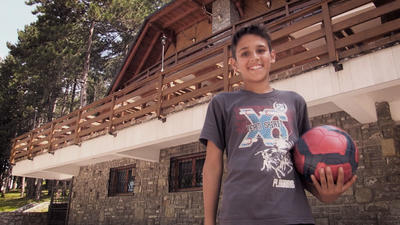Paris, Thursday 16th November 2017 - French President Emmanuel Macron vowed on the 27th July 2017 to ensure those awaiting asylum in France would be housed. He said he didn’t want to see any men or women on the streets by the end of the year.
Yet as temperatures drop and winter approaches around 1,000 refugees and migrants are still sleeping rough on the streets of Paris today say Médecins du Monde – Doctors of the world (MDM) and Médecins Sans Frontières – Doctors Without borders (MSF). They are mainly scattered across the north east of the city and the borough of Seine-Saint-Denis.
Refugees and migrants try to find shelter where they are hidden from authorities yet also close to Reception Center for Migrants (‘Centre de Premier Accueil’) at Porte de la Chapelle in Paris. At the Reception Center migrants can start their asylum application; organisations providing support to migrants have established themselves nearby.
The situation has become considerably more difficult for migrants in Paris since the destruction of camps on the 18th August 2017 when more than 2,700 people were living around Porte de la Chapelle. Since then, migrants are constantly moved on and hassled at night by authorities. Refugees and migrants are forced to hide if they are to get any sleep at night and are often left without a duvet, any kind of blanket or a tent.
Ibrahim*, from Sudan, told MSF medical teams:
“The rain and the police make it unbearable here. The rain forces us to huddle under bridges and once we’ve set up shelter the police turn up and tell us to move on. Since I left Sudan and have been on the move, police have continually followed me. I didn’t think the treatment would be the same in France. Here we have nowhere to sleep. As soon as we sit somewhere the police arrive and tell us to move. In the middle of the night they wake us up and make us move. Each time we ask them “Move on, but where to? Where can we go?” Every time they tell us “I don’t know, just leave”. I don’t have any other option but to claim asylum here. In Sudan there is only death.”
Invisible to the local population and isolated on the streets of Paris, access to basic health care and services is becoming more and more difficult for the refugees and migrants. Every day, in our clinics and through assessments on the streets, our medical teams see the health of migrants getting worse. This is especially true now that winter is approaching and migrants have little chance of getting access to proper shelter and basic services.
Corinne Torre, Head of Mission in France for MSF said:
“The temperature has dropped and migrants are still living on the streets without any prospects for housing. They not even allowed to wash themselves outdoors any more. Their only solution is to use public bathhouse facilities but they often have to pay and sometimes they are turned away. The terrible conditions they face mean there is a real risk of an increase in skin infections and scabies”.
Policies that make it difficult for refugees and migrants to claim asylum, never letting them rest in one location and the severe lack of information available to them makes people who are already very fragile, often having gone through a traumatic journey to get to Paris, even more vulnerable. The French state is trying deny refugees and migrants their basic needs instead of creating an environment where they are welcomed with dignity and respect as human beings.
Jemal, from Ethiopia, has been in Paris for one month. He says:
“This situation is absurd and I’ve known refugee camps in Africa. There the UN camps can be chaotic and precarious, but at least most of the time we have a tent, something to eat, access to information and we are safe. Here the only information we get is rumours and the police persecute us as if we were criminals.”
MSF and MDM are calling for immediate and unconditional access to humane shelter for refugees and migrants as well as the end of police harassment.
Dr Francoise Sivignon, President of Médecins du Monde in France says:
“As winter arrives, it is not the time to pay lip service to this issue. Migrants urgently need access to shelters and we need to see the opening of more reception centres soon. It is essential that migrants are protected and get the tailored support they need. Public authorities must act as quickly as possible.”





